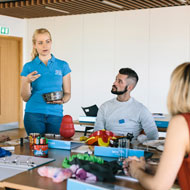
Training programmes aim to boost standards
Battersea Dogs and Cats home has launched a new academy to support the professional development of rescue and rehoming centres.
Delivered by experts from the charity, the Battersea Academy’s educational programmes are designed to give participants knowledge and practical skills to run their centres to the highest possible standard.
It will be based at the charity’s centre in south London and aims to enable every rescue, whatever their size and resources, to do the best with what they have.
Training topics will include ethical decision making, the animal journey and introducing change. Training is tailored to the organisation’s needs and can last two to five days, including a mixture of classroom, workshop and practical hands-on training with Battersea animals.
Battersea’s deputy chief executive Peter Laurie, commented: “At Battersea, we strive to improve the lives of every dog and cat.
“For 158 years our charity has rescued and rehomed dogs and cats in need of our help across the UK. Now we’re using our unparalleled experience and expertise to help dogs and cats beyond our gates, using the knowledge we’ve gained over years of working on the frontline to help improve the lives of many more dogs and cats that we will never see.”
Several rescue and rehoming organisations have already taken part in the training, both in the UK and overseas.
Sofia Pavlin, committee member for for the non-profit organisation Udruga Snoopy in Croatia, added: “I feel the biggest impact from the programme for us has been seeing what can be achieved with the limited resources we have and understanding the small steps we can take that will eventually lead to achieving those results in the long term.
“It may take us some time to bring in all the improvements we would like, but just a few small changes here and there have really enhanced the quality of life for our dogs and volunteers.”
Image © Battersea



 The Animal and Plant Health Agency (APHA) has updated its online reporting service for dead wild birds.
The Animal and Plant Health Agency (APHA) has updated its online reporting service for dead wild birds.